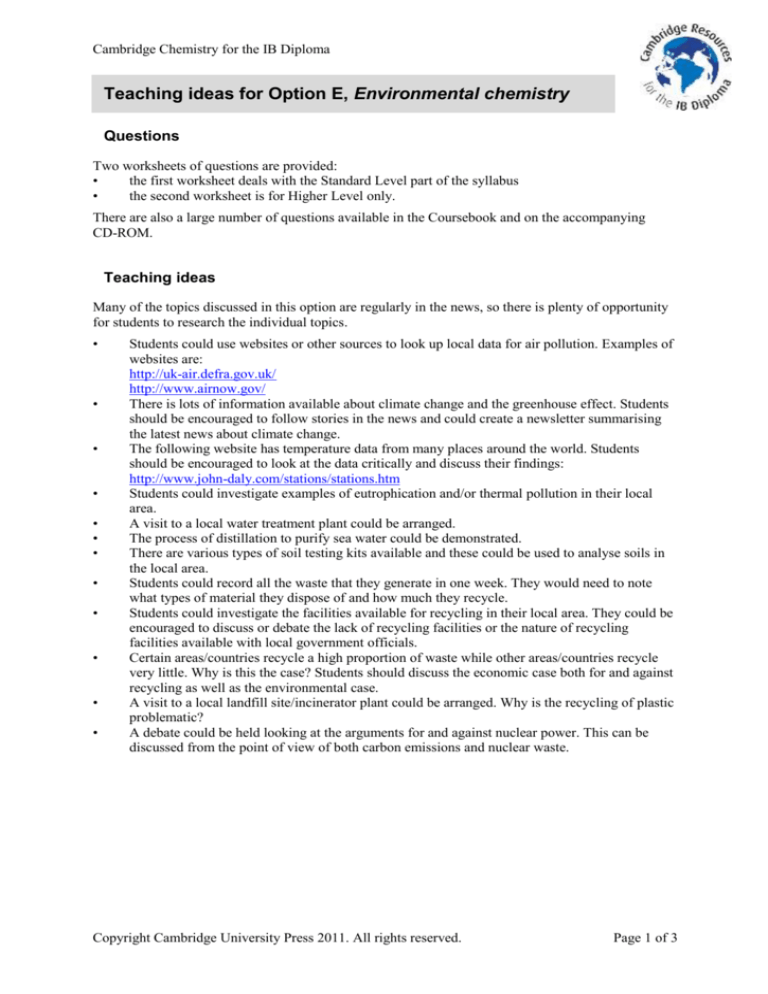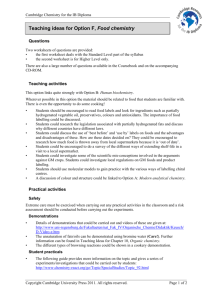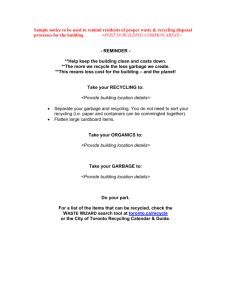
Cambridge Chemistry for the IB Diploma
Teaching ideas for Option E, Environmental chemistry
Questions
Two worksheets of questions are provided:
•
the first worksheet deals with the Standard Level part of the syllabus
•
the second worksheet is for Higher Level only.
There are also a large number of questions available in the Coursebook and on the accompanying
CD-ROM.
Teaching ideas
Many of the topics discussed in this option are regularly in the news, so there is plenty of opportunity
for students to research the individual topics.
•
•
•
•
•
•
•
•
•
•
•
•
Students could use websites or other sources to look up local data for air pollution. Examples of
websites are:
http://uk-air.defra.gov.uk/
http://www.airnow.gov/
There is lots of information available about climate change and the greenhouse effect. Students
should be encouraged to follow stories in the news and could create a newsletter summarising
the latest news about climate change.
The following website has temperature data from many places around the world. Students
should be encouraged to look at the data critically and discuss their findings:
http://www.john-daly.com/stations/stations.htm
Students could investigate examples of eutrophication and/or thermal pollution in their local
area.
A visit to a local water treatment plant could be arranged.
The process of distillation to purify sea water could be demonstrated.
There are various types of soil testing kits available and these could be used to analyse soils in
the local area.
Students could record all the waste that they generate in one week. They would need to note
what types of material they dispose of and how much they recycle.
Students could investigate the facilities available for recycling in their local area. They could be
encouraged to discuss or debate the lack of recycling facilities or the nature of recycling
facilities available with local government officials.
Certain areas/countries recycle a high proportion of waste while other areas/countries recycle
very little. Why is this the case? Students should discuss the economic case both for and against
recycling as well as the environmental case.
A visit to a local landfill site/incinerator plant could be arranged. Why is the recycling of plastic
problematic?
A debate could be held looking at the arguments for and against nuclear power. This can be
discussed from the point of view of both carbon emissions and nuclear waste.
Copyright Cambridge University Press 2011. All rights reserved.
Page 1 of 3
Cambridge Chemistry for the IB Diploma
Practical activities
Safety
Extreme care must be exercised when carrying out any practical activities in the classroom and a risk
assessment should be conducted before carrying out the experiments.
Student practicals
•
The following website contains details of resources and experiments that can be carried out on
acid rain:
http://www.epa.gov/acidrain/education/experiments.html
Students could carry out simple experiments investigating the greenhouse effect using a glass
tank with a thermometer/temperature probe inside. They will need to put different substances
into the tank, and then leave the tank and contents in the sun. Ideas for lessons and experiments
are given in:
http://www.windows2universe.org/earth/climate/climate.html
http://www.juliantrubin.com/encyclopedia/environment/globalwarming.html
Students could carry out experiments to measure dissolved oxygen/BOD using the Winkler
method or a probe. Details of experiments are given at:
http://www.ecy.wa.gov/programs/wq/plants/management/joysmanual/4oxygen.html
http://water.epa.gov/type/rsl/monitoring/vms52.cfm
http://ocw.mit.edu/courses/earth-atmospheric-and-planetary-sciences/12-097-chemicalinvestigations-of-boston-harbor-january-iap-2006/labs/dissolved_oxygen.pdf
Students could measure the solubility products of sparingly soluble salts. Procedures for this are
to be found in the following websites:
http://www.instruction.greenriver.edu/knutsen/chem160/soluprod.html
http://www.cpet.ufl.edu/bestpractices/PDF/Physical%20Science/Changes%20in%20Matter/
Determining%20the%20Solubility%20Product%20Constant%20for%20a%20Slightly%20
Soluble%20Salt.pdf
http://www.chemistry.ucsc.edu/teaching/roland/Chem1N/procedures/1N_10_Kspproc.pdf
•
•
•
ICT
There are many excellent websites available that are relevant to this topic. Students should, wherever
possible, be encouraged to look up original data and to try to draw their own conclusions.
•
•
•
•
•
Climate change:
http://www.explainingclimatechange.ca/
http://www.epa.gov/climatechange/index.html
http://ncar.ucar.edu/learn-more-about/climate
http://www2.ucar.edu/
http://news.bbc.co.uk/weather/hi/climate
http://www.ltscotland.org.uk/exploringclimatechange/index.asp
http://data.giss.nasa.gov/gistemp/graphs/
http://www.ipcc.ch/pdf/assessment-report/ar4/syr/ar4_syr.pdf
Ozone:
http://www.theozonehole.com/
http://www.atm.ch.cam.ac.uk/tour/
http://ozonewatch.gsfc.nasa.gov/index.html
CFC numbering:
http://cdiac.ornl.gov/pns/cfcinfo.html
Eutrophication:
http://coseenow.net/blog/eutrophication-animation/
Water treatment:
http://www.dr-evans.com/advancedbiology/sewageanimation.html
http://www.geafiltration.com/technology/reverse_osmosis_flash.asp
Copyright Cambridge University Press 2011. All rights reserved.
Page 2 of 3
Cambridge Chemistry for the IB Diploma
•
•
Waste:
http://www.recyclenow.com/how_is_it_recycled/
http://www.limerecycling.com/waste-streams/dry-mixed-recycling/dry-mixedrecycling
http://www.recyclingglass.co.uk/the-glass-recycling-cycle
http://www.furryelephant.com/content/radioactivity/nuclear-power/
http://www.5min.com/Video/Recycling-Plastic-Water-Bottles-201063942
Green chemistry:
http://www.rsc.org/Education/Teachers/Resources/green/
Theory of knowledge (TOK)
The two sides in the climate change debate could be discussed. Why do different scientists believe
different things?
There are many videos available in support of man-made global warming, but the video below
presents the case against:
http://video.google.com/videoplay?docid=-5576670191369613647#
It could be debated how fairly this video and ‘An Inconvenient Truth’ put the argument for each side.
Copyright Cambridge University Press 2011. All rights reserved.
Page 3 of 3







